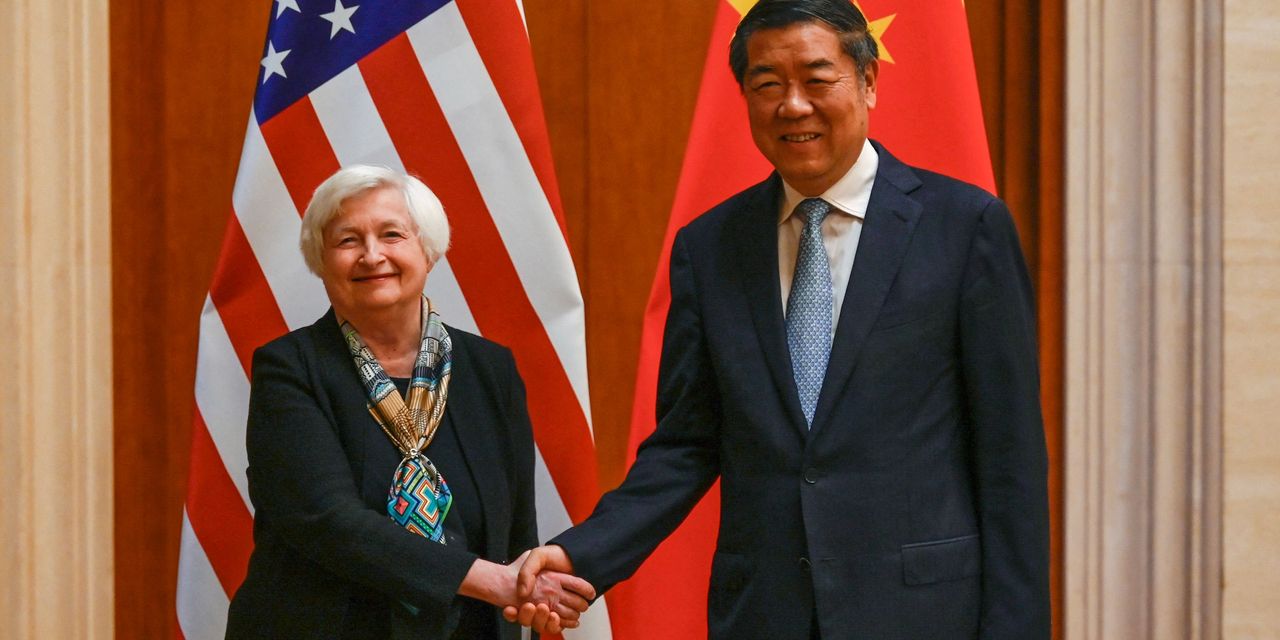U.S. Treasury Secretary Janet Yellen’s trip to China reopened dialogue between the two countries with an intent to minimize dangerous miscommunications.
That’s the good news. The bad: The trip did little to allay investors’ concerns about the deteriorating relationship, especially with several developments on the horizon that could inflame tensions further.
Yellen continued the Biden administration’s pivot away from talking about decoupling from the world’s second largest economy, instead describing U.S. efforts around its critical supply chains as an attempt to “diversify.” On her visit over the weekend, Yellen stressed that the global economy is big enough for both the U.S. and China to thrive, and it’s critical for the two to find ways to work together on certain fronts.
While there is a growing realization that a decoupling between the world’s two largest economies is “virtually impossible,” as Yellen noted, actions confirm a serious rethink about the link between the two countries in key areas like semiconductors as the U.S.—and its allies—restrict China’s access to critical technology.
Chinese leader Xi Jinping has called for new measures to woo foreign investors as its economy struggles to build momentum. But the U.S. is considering further restrictions, including U.S. investments into China—an issue Chinese officials raised with Yellen.
Restrictions could come on several fronts including limiting Chinese companies’ ability to access U.S. cloud-computing services, a loophole in last fall’s semiconductor export controls that could be closed when the regulations are completed, according to a note to clients from Beacon Policy Advisors analysts.
The long-anticipated executive order on outbound investments into China is also expected as early as this month, with analysts estimating it to be narrowly crafted at first. Beacon Policy Advisors analysts note wrangling within the administration on restrictions around artificial intelligence investments so that it doesn’t cast too wide a net.
“It is possible that the final executive order targets a very specific set of transactions and that the limits on use of cloud-computing services would be relied on to more broadly restrict China’s development of artificial intelligence,” Beacon analysts write.
“Either of these actions could lead to further Chinese export controls, continued escalation of which may force a rethinking of the aggressiveness of Biden’s de-risking plan given the continued reliance on China for strategic raw materials.”
That is the concern of investors, with analysts at asset manager RockCreek cautioning investors in a note that the administration’s limits on outbound investments into China—even if drawn narrowly at first in terms of national security—is likely to be seen by China as “economically threatening.”
How Beijing responds is the big question. China recently banned exports of gallium and germanium, critical in making semiconductors, missiles and solar cells—a response of sorts to U.S. restrictions that curtailed China’s access to critical advanced technology and chip exports.
The move is seen as a first step toward a total export ban and a reminder of the power China holds in global supply chain. “This regime could be extended to other, more widely used minerals if China feels a need to escalate further,” Beacon analysts write.
But the move is also likely to further hasten countries’ search for alternative sources of rare earth minerals, with Vietnam well-positioned to step in though RockCreek writes that it has roughly just half of China’s estimated reserve.
Also unlikely to soothe investors’ concerns about the geopolitical risks created by the shifting U.S.-China relations: The Select Committee on the Chinese Communist Party is due to hold a hearing on Thursday about the “growing peril” facing American companies in China. The U.S. last month warned U.S. companies could face penalties for regular business activities in China in the wake of the country’s new counterespionage laws.
The relationship continues to present peril for investors as well—how broadly has yet to be determined.
Write to Reshma Kapadia at [email protected]
Read the full article here







